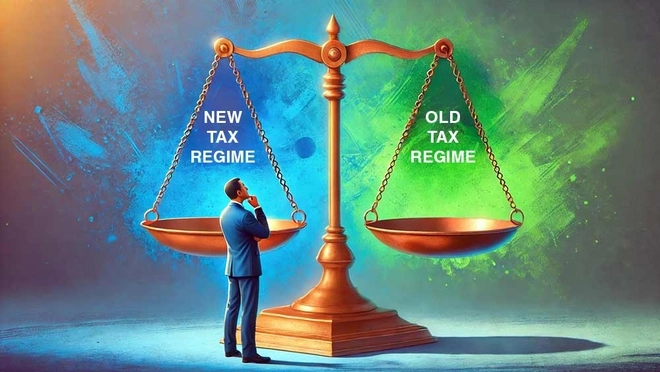Income tax
Standard Deduction Under New Tax Regime

In 2020, India introduced a new regime of income tax, leaving the existing one at the choice of the assesses while aiming at rationalizing its tax structure and offering relief to many taxpayers. Further modifications in this system were made in the fiscal year 2024-25, and now it has brought major changes in the standard deduction. This paper will cover significant issues related to the standard deduction under the new tax regime of India for 2024.
What is Standard Deduction?
Standard deduction refers to a fixed amount that may be allowed as a deduction from gross income by salaried individuals and pensioners before arriving at their taxable income. It is meant to give some tax relief and account for work-related expenses without requiring itemized deductions.
Standard Deduction Evolution in India
The concept of a standard deduction, in any case, is not new to India. It was introduced first in the year 1974 and was abolished in 2005. It was re-introduced in 2018 in the old tax regime. When a new tax regime was introduced in 2020, a provision for standard deduction was not there in it at the very first instance.
Introduction of Standard Deduction in the New Tax Regime
Among the big-ticket changes effected in the 2023 Union Budget was the fact that it extended the standard deduction to the new regime, w.e.f. A.Y. 2024-25 (F.Y. 2023-24), with an aim and view to making the regime more lucrative for the taxpayer.
Standard Deduction Amount for 2024
Under the regime of new tax 2024, the amount for standard deduction is ₹50,000. This is at par with what is available under the old regime for reasons of parity between the two.
Eligibility Criteria for Standard Deduction
Following conditions must be fulfilled by an individual to claim a standard deduction under the new tax regime:
1. They should be salaried employees or pensioners.
2. They should opt for the new tax regime.
3. Their income shall fall under the head “Income from Salary”
It is to be kept in mind that this deduction is not applicable to self-employed individuals and to those earning the major part of their income from business or profession.
Impact on Taxable Income
Standard deduction is directly deducted from the taxable income of eligible taxpayers under the new regime. If the gross salary of an employee is ₹8,00,000, the standard deduction available to such employee shall be ₹50,000 and, hence his taxable income will be ₹7,50,000.
Old Tax Regime vs New Tax Regime
Though the amount of standard deduction for both regimes is the same, the following points of distinction exist:
1. Various other deductions and exemption are available under the old regime apart from the standard deduction
2. New regime has lower rates with less number of deductions
The tax liability shall be computed under both the regimes prior to filing of the tax return for claiming the benefit of the new tax regime.
Other Deductions under the New Tax Regime
The new tax regime for 2024, has got very limited deductions available apart from the standard deduction-
1. Employer contribution to NPS
2. Family pension deduction
3. Agricultural income up to ₹5,000
It is worthwhile to mention that some of the popular deductions, like HRA, LTA, and deductions available under Sec 80C, were removed in this regime.
Income Tax Slabs under New Regime for 2024
New slabs for availing income tax regime will be in force in 2024. These are as follows :
– Income up to ₹3 lakh: No tax
– ₹3-6 lakh: 5%
– ₹6-9 lakh: 10%
– ₹9-12 lakh: 15%
– ₹12-15 lakh: 20%
– Above ₹15 lakh: 30%
These slabs when combined with the standard deduction, enable many taxpayers to have lesser tax liability under this regime than in the old regime.
Under the new tax regime in India, the standard deduction for salaried individuals has been set at ₹50,000. Here is a table showing the standard deduction and various deductions for different salary levels:
| Salary (₹) | Standard Deduction (₹) | HRA Deduction (₹) | Section 80C Deduction (₹) | Total Deductions (₹) |
|---|---|---|---|---|
| 5,00,000 | 50,000 | Applicable | Up to 1,50,000 | 2,00,000 + HRA |
| 7,50,000 | 50,000 | Applicable | Up to 1,50,000 | 2,00,000 + HRA |
| 10,00,000 | 50,000 | Applicable | Up to 1,50,000 | 2,00,000 + HRA |
| 12,50,000 | 50,000 | Applicable | Up to 1,50,000 | 2,00,000 + HRA |
| 15,00,000 | 50,000 | Applicable | Up to 1,50,000 | 2,00,000 + HRA |
| 20,00,000 | 50,000 | Applicable | Up to 1,50,000 | 2,00,000 + HRA |
Pros and Cons of Opting for the New Tax Regime
Pros:
1. Easy and simple tax structure
2. Lower rates of taxes
4. No proofs to be maintained for various deductions
4. Helpful to those people with less or nil investments and deductions
Cons:
1. Few deductions are allowed
2. Higher tax liability for people with more investments and claiming deductions
3. This may deter long-term savings and investments
How to Claim Standard Deduction
To claim the standard deduction in the new regime:
1. While filing your ITR, select the option for the new tax regime.
2. The standard deduction will get automatically subtracted from your gross salary.
3. Please ensure that you’re filing the correct ITR form, which permits availing of the new tax regime
Way Forward
Introduction of standard deduction in the new tax regime is one such measure taken to make it more attractive for taxpayers. As the government streamlines and further tweaks the tax structure, the deductions and exemptions could further get modified in coming years.
Conclusion Inclusion of standard deduction in India’s new tax regime for 2024 presents itself as a very key change in its taxation landscape. While this simplifies the tax structure and probably reduces tax liability for most people, the decision to opt for this regime needs to be done based on individual financial circumstances. Taxpayers are advised to carefully evaluate both regimes with respect to income, investments, and eligible deductions before opting for any of them. Accounting for specific personalized guidance through these changes and development of the best possible tax strategy will come from consulting with a tax professional.
-

 Credit Card2 years ago
Credit Card2 years agoHow to Foreclose ICICI Credit Card EMI
-

 Saving Schemes2 years ago
Saving Schemes2 years agoHow to Check Sukanya Samriddhi Account Balance by SMS
-

 Credit Card2 years ago
Credit Card2 years agoHow to Unblock Credit Card ICICI
-

 Government Schemes1 year ago
Government Schemes1 year agoHow to Apply for Ayushman Bharat Yojana: A Step-by-Step Guide
-

 Saving Schemes2 years ago
Saving Schemes2 years agoHow to Open a Sukanya Samriddhi Account Online: A Step-by-Step Guide
-

 Government Schemes2 years ago
Government Schemes2 years agoGovernment Schemes for Girl Child
-
Credit Card2 years ago
How to Check ICICI Credit Card Balance
-

 Credit Card2 years ago
Credit Card2 years agoHow to Change Address in ICICI Credit Card
